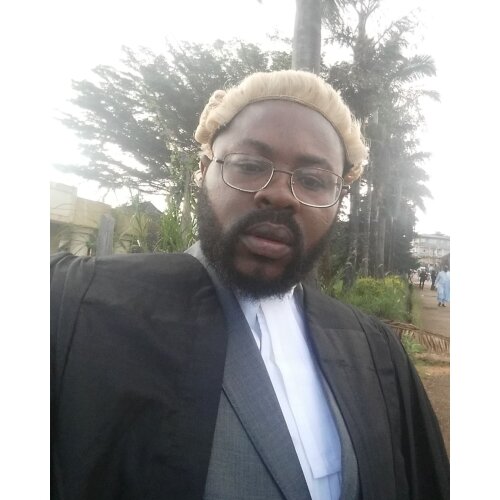Best Communications & Media Law Lawyers in Limbe
Share your needs with us, get contacted by law firms.
Free. Takes 2 min.
List of the best lawyers in Limbe, Cameroon
About Communications & Media Law in Limbe, Cameroon
Communications & Media Law in Limbe, Cameroon covers legal matters related to media activities, such as print and broadcast journalism, social media, advertising, broadcasting, film production, and other related issues. This legal field ensures the protection of rights, regulations of conducts and responsibilities of every party involved in communication and media sectors. It is shaped by a combination of both national laws and international treaties that Cameroon is party to, including the Universal Declaration of Human Rights and the International Covenant on Civil and Political Rights.
Why You May Need a Lawyer
Intertwined with various laws and ethical guidelines, Communications & Media Law can be complex to navigate. You may require a lawyer if you are a journalist faced with legal challenges regarding your work, an advertiser ensuring your content complies with laws, or a broadcaster faced with licensing issues. Furthermore, digital content creators also might need legal input for matters concerning copyright, privacy, defamation and censorship.
Local Laws Overview
The Constitution of Cameroon guarantees freedom of expression and freedom of the press. However, there are specific laws that regulate the media industry, like the Cameroon Penal Code criminalizes defamation & insult, the law n°90/052 regulates social communication, defining the conditions in which media houses and journalists operate, and Law N°2010/012 governing electronic communications in Cameroon, which covers telecommunications and digital communications. Understanding these laws and others is crucial to operating within legal bounds within the communications & media industry in Limbe.
Frequently Asked Questions
What does Communications & Media Law Cover in Limbe?
This law encompasses various subsections of law including: defamation (libel and slander), privacy, intellectual property, censorship, and advertising regulations among others.
What Are the Penalties for Defamation?
Defamation can lead to criminal charges under the Cameroon Penal Code, with potential fines and imprisonment.
How Is Copyright Protected?
Under the Law N°2000/011 on copyright and neighbouring rights in Cameroon, author’s rights are protected. Violations can lead to penalties including compensation for damages and profits lost.
Are There Restrictions On Advertising?
Yes, false advertising is prohibited in Cameroon. Advertisements must not be misleading and must comply with the country's advertising regulations, ethics and codes.
Who Regulates Broadcast Media?
The National Communication Council (NCC) is responsible for the regulation of broadcast media in Cameroon.
Additional Resources
For additional information and resources, you might check the websites of the National Communication Council (NCC), the Ministry of Communication, and the Ministry of Posts and Telecommunications. Local law firms and legal practitioners can provide further guidance specific to your case.
Next Steps
If you require legal assistance in Communications & Media Law, seek advice from a local legal professional who specializes in this field. They can provide specific legal advice tailored to your situation. Ensure to provide them with all necessary details related to your case for the best legal assistance.
Lawzana helps you find the best lawyers and law firms in Limbe through a curated and pre-screened list of qualified legal professionals. Our platform offers rankings and detailed profiles of attorneys and law firms, allowing you to compare based on practice areas, including Communications & Media Law, experience, and client feedback.
Each profile includes a description of the firm's areas of practice, client reviews, team members and partners, year of establishment, spoken languages, office locations, contact information, social media presence, and any published articles or resources. Most firms on our platform speak English and are experienced in both local and international legal matters.
Get a quote from top-rated law firms in Limbe, Cameroon — quickly, securely, and without unnecessary hassle.
Disclaimer:
The information provided on this page is for general informational purposes only and does not constitute legal advice. While we strive to ensure the accuracy and relevance of the content, legal information may change over time, and interpretations of the law can vary. You should always consult with a qualified legal professional for advice specific to your situation.
We disclaim all liability for actions taken or not taken based on the content of this page. If you believe any information is incorrect or outdated, please contact us, and we will review and update it where appropriate.








